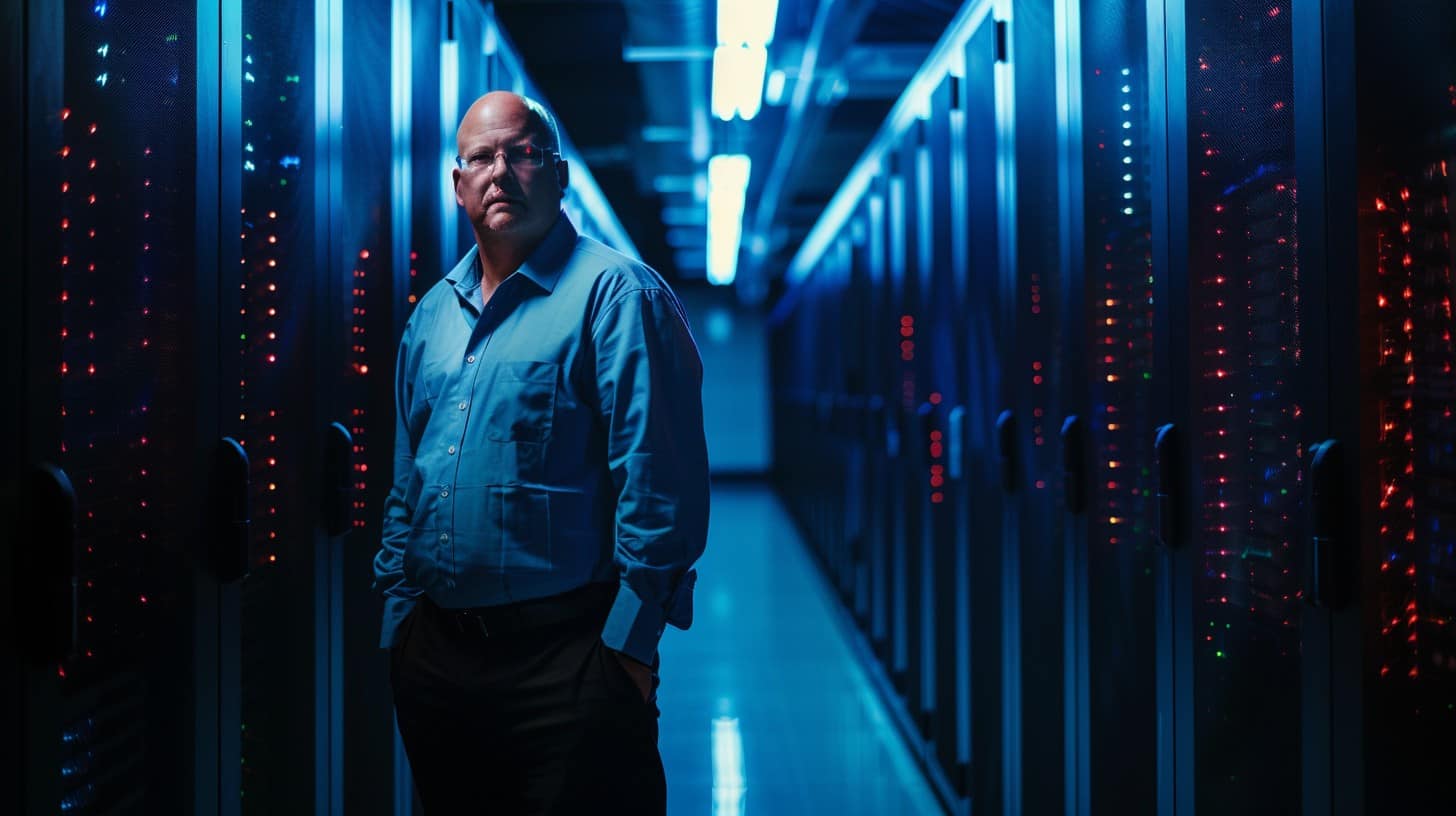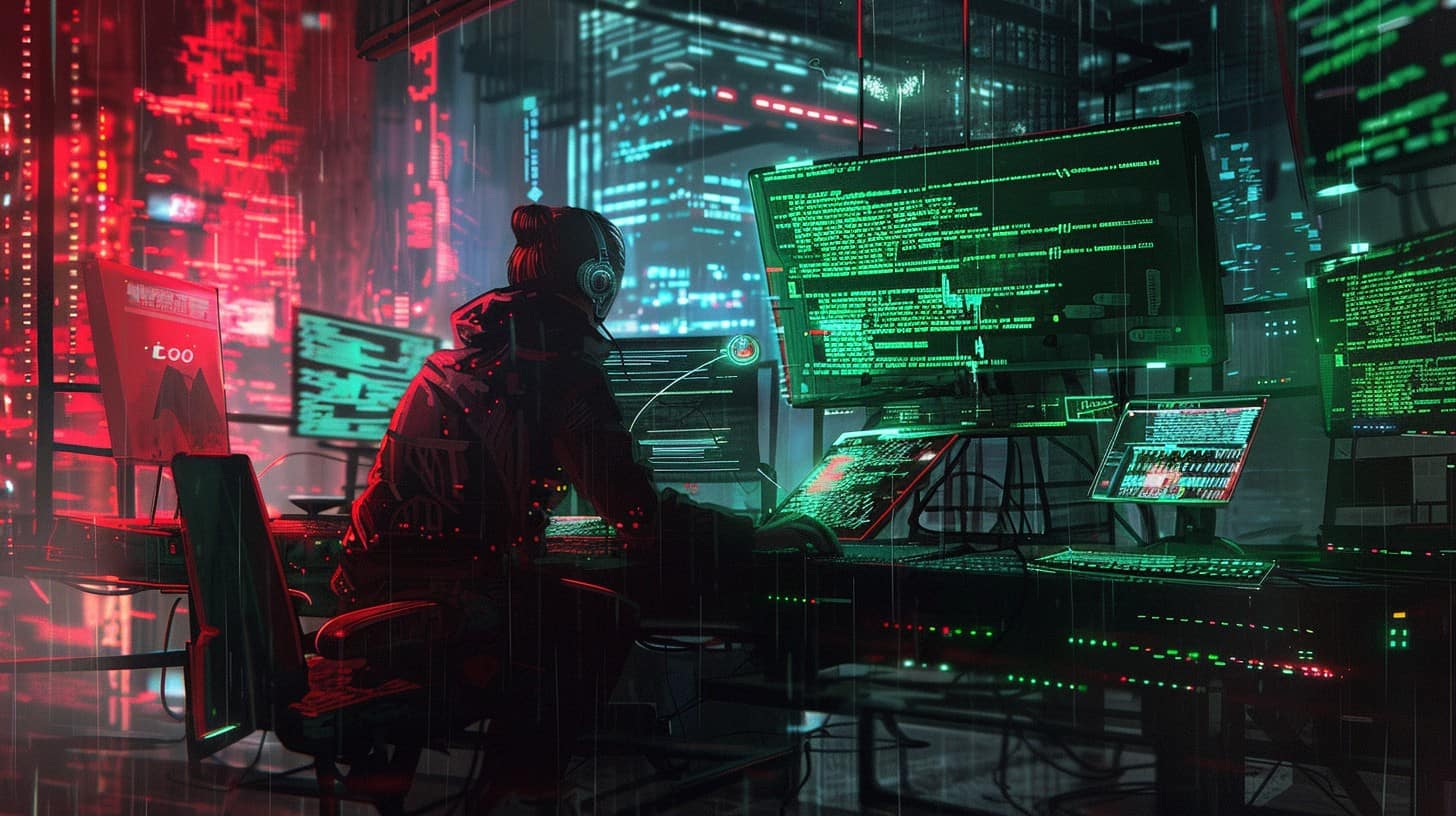Welcome to the digital battlefield. If you’re here, it’s likely because the term “cybersecurity” has piqued your curiosity… or maybe because you’ve heard it’s a tough nut to crack and wondered, “Is this true?” Good news: You’re about to find out.
Our article is a treasure map leading you through mysterious lands—lands filled with codes, virtual threats, and protective shields (think firewalls and antivirus programs). You’ll discover why safeguarding data is akin to guarding precious gems, and how becoming an internet safety warrior isn’t just beneficial; it’s necessary in our connected world.
Get ready for insights topped with expert tips that will not only make cybersecurity less scary but could also unlock your potential in ways you hadn’t imagined, especially within the realm of iGaming software development. Excited yet? Let’s embark on this journey together!
Key Takeaways
Cybersecurity is like guarding the internet’s treasures. We learn to stop hackers using tools like firewalls and antivirus programs.
Learning cybersecurity means dealing with fast tech changes, such as AI. Hackers get smarter, so we must too.
Key skills for cybersecurity heroes include setting up security systems, solving tech puzzles, and staying cool under pressure.
Ethical thinking is crucial. We use our powers for good, ensuring privacy and trust in the digital world.
The future challenges us to keep learning and adapting to protect against new cyber threats with emerging technologies.
Table of Contents
Understanding Cybersecurity

Cybersecurity is like the guardian of the internet, keeping bad guys at bay. It involves protecting computers, networks, programs, and data from unauthorized access or attacks. Think about it as locking your digital doors and windows so that hackers can’t sneak in.
Just as a locksmith knows the ins and outs of locks to keep homes safe, cybersecurity pros use tools like firewalls and antivirus software to protect valuable information.
Getting into cybersecurity means learning how to spot weaknesses in digital defenses before cybercriminals do. You’ll learn about malware—nasty software designed to damage or take control of your tech—and how penetration testing (trying to break into systems on purpose) helps find these weak spots.
Plus, you’ll dive into network protection techniques, ensuring that private data stays exactly that: private. With hackers getting smarter every day, staying one step ahead is a thrilling challenge for those with a passion for tech puzzles.
Why is Cybersecurity Important?

Cybersecurity keeps our online life safe. Just like a strong lock protects your house, cybersecurity guards against cyber threats. These nasties include hackers, phishing scams, and data breaches.
Imagine playing your favorite game online or betting in a casino app without it! Scary thought, right? That’s where iGaming software development comes into play. It uses top-notch security measures to keep things fair and secure for players around the globe.
In 2021, cyber attacks hit record numbers. Everyone from big businesses to regular folks found themselves targets. Cybersecurity steps in to shield digital treasures and personal info from these attacks.
Let’s face it; no one likes their secrets spilled or bank account hacked! Plus, maintaining customer trust is key for any business out there—everyone wants to feel their data is in good hands.
So yeah, cybersecurity isn’t just important—it’s essential in today’s tech-savvy world.
Is Cybersecurity Hard to Learn?

Diving into cybersecurity is like learning a new language, but instead of words, you’re grappling with codes and digital threats. Sure, it’s challenging with all the fancy tech and sneaky hackers out there.
But hey, who doesn’t love a good challenge? Stick around to discover how you can become a pro.
Technological evolution
Technology moves fast, like a cheetah chasing the fastest gazelle. One day, you’re learning about cloud security, and the next, AI technology is knocking at your door. This rapid change makes cybersecurity tough to master.
Tools and systems get updates or become old news faster than a hot meme. You’ve got to keep up with things like artificial intelligence helping defend against hacks and quantum computing shaking up encryption methods.
But here’s the kicker: as everything from networks to databases evolves, so do cyber threats. Hackers aren’t sleeping; they’re leveling up their game just as quickly—if not quicker—than us good guys protecting information security.
So, while you’re getting the hang of intrusion detection systems today, tomorrow might introduce a whole new set of challenges needing a different toolbox. And now that we’ve peeked into how tech evolution complicates cybersecurity learning, let’s dive into why mastering various tools becomes essential for anyone in this field.
Wide variety of tools needed
Diving into cybersecurity, you’ll find yourself juggling a bunch of tools. Think of it like being in a kitchen filled with gadgets from blenders to zesters; only here, your recipe is for digital safety.
You’ve got ethical hacking tools and programs that let you sniff out bugs just like a hound. And don’t forget, every hacker has their favorite set of lock picks – in our world, those are software for finding weaknesses in networks.
Cyber pros also rely on different instruments to keep tabs on the vast cyberspace. From monitoring apps that alert you to sneaky moves against your data fortresses to analytics tools that help paint the big picture of network health.
Plus, patching up security holes means having quick access to updates across all fronts – sorta like keeping your toolbox topped off and ready. Speaking of readiness, staying ahead requires not just brains but the best gear too…
now onto figuring out how threats can hit from any corner.
Threats can come from anywhere
Cyber threats don’t play favorites. They target big companies, small shops, and even your grandma’s email. Imagine, one day you’re sipping coffee, feeling safe because you have a password on your Wi-Fi.
The next thing you know, bam! A hacker from halfway across the globe is sending spam from your account. It’s like leaving your front door unlocked—anyone can walk in.
Now think about artificial intelligence (AI). It’s getting smarter by the minute, helping cybersecurity pros stay one step ahead of bad actors. But here’s the twist: those same tools—like machine learning algorithms—are also in the toolbox of cybercriminals looking to crack codes and sneak past defenses.
Just as AI can spot a security breach before it happens, it can also create attacks that no human brain could dream up. So yeah…the internet’s wild west doesn’t sleep, and neither should our vigilance against these invisible showdowns at high noon.
Essential Skills for Success in Cybersecurity

To crack the code of cybersecurity, you’ve got to arm yourself with some key skills. Think of it like being a digital detective—you need sharp tech know-how and a knack for solving puzzles.
Technical Skills
Technical skills are the bread and butter of cybersecurity. Learn how to set up firewalls, intrusion detection systems, antivirus programs, and encryption methods. These tools help keep hackers at bay and protect sensitive data.
You’ll also need a solid grasp of computer programming and coding—think of it as learning the language of computers.
On top of that, networking knowledge is crucial. Understanding how different parts of the internet connect helps you predict where threats might come from. It’s like being a digital detective, piecing together clues to stop cybercriminals in their tracks.
Get your hands dirty with some real-world practice by setting up your own virtual network at home—it’s a fun way to learn!
Critical Thinking and Problem-solving
After mastering technical skills, diving into critical thinking and problem-solving is like unlocking a new level in a game. Solving puzzles isn’t just about knowing which piece fits; it’s seeing the big picture.
Cybersecurity throws curveballs that require you to think on your feet. Imagine being Sherlock Holmes, but instead of solving mysteries, you’re hunting down cyber threats. You analyze patterns, spot anomalies, and make split-second decisions.
This skill set isn’t something you learn overnight—it grows as you face new challenges.
Professionals use tools like ethical hacking and risk assessments to outsmart hackers. It’s like playing chess with someone trying to sneak past your defenses. You need to predict their moves and plan several steps ahead.
Critical thinking turns problems into solutions, transforming obstacles into opportunities for learning and growth in cybersecurity fields such as incident response or risk management—no room for guesswork here; every move counts in protecting sensitive data from malicious eyes.
Continuous Learning and Adaptability
In the fast-paced world of cyber defense, staying ahead is a must. Think of cybersecurity as a never-ending race where hackers keep setting up new hurdles. You need to jump higher and run faster every time.
Grabbing certificates isn’t just for show; it’s like collecting power-ups to boost your skills in risk evaluation, system fortifying, and threat neutralization. Engaging with the online community or attending workshops feels like teaming up with other players.
Each level brings tougher challenges but also makes you smarter and quicker on your feet.
To stay sharp, mix theory with practice – dive into internships or explore real-world projects. Imagine coding not just as typing away in solitude, but as crafting shields and swords for battle against cyber villains.
Schools offer knowledge, sure, but hacking into problems and patching them up teaches resilience and adaptability—key traits for any aspiring guardian of cyberspace. Every cleared hurdle marks growth, transforming novices into sought-after sages in network safety, information integrity, and digital privacy protection.
Communication and Collaboration
Jumping from the need for continual learning, let’s chat about working together and talking it out—communication and collaboration. As a cybersecurity pro, you’re like a coach yelling plays to your team.
You gotta pass messages clearly across computer networks, make plans with folks in different tech departments, and sometimes break down geek-speak into human words during security audits.
It’s all about keeping everyone on the same digital page.
You also play captain by leading awareness campaigns on safe internet habits at work. Think of it as teaching your crew how to spot phishing scams before they click that “too-good-to-be-true” link.
Plus, teamwork makes the dream work when creating security rules with legal eagles and compliance crews—a real ‘Avengers assemble’ moment for guarding against cyber villains!
Ethical Mindset and Integrity
After mastering how to work well with others, let’s talk about staying on the right path. Having an ethical mindset and integrity is like holding a compass that always points you toward doing what’s right in the world of internet security.
It isn’t just about knowing how to fight off hackers; it’s about being someone people can trust with their most private information. Think of yourself as a superhero who uses their powers for good—you protect secrets and keep bad guys at bay.
Practicing ethically correct hacking and diving into reward programs for spotting bugs are great ways to hone your skills while keeping your moral compass in check. Plus, joining a cybersecurity group can give you allies on your journey, making sure you stay motivated and supported in sticking to high ethical standards.
Remember, being part of this field means more than just having sharp technical skills; it means being a guardian of digital trustworthiness.
The Role of a Cybersecurity Professional

Cybersecurity pros are like digital detectives. They search for clues to stop hackers and keep data safe.
Risk Assessment and Analysis
Risk assessment and analysis are the bread and butter of a cybersecurity pro. They dive deep to spot potential security problems that could bite organizations in the digital behind.
It’s like being a digital detective, looking for clues and connecting dots to prevent cyber crimes before they happen. Ethical hacking, using simulated attacks on systems, sharpens these skills, helping pros understand how to fortify networks against real threats.
Critical thinking hits its stride here, as analysts evaluate risks and decide on the best defenses. Certifications showcase one’s expertise in spotting and stopping cyber dangers.
Joining discussions with other cybersecurity minds can shed light on new methods or overlooked vulnerabilities. Now, onto setting up safeguards….
Implementing Security Measures
Cybersecurity pros have a big job. They put in place ways to keep our digital life safe. Think of them as internet superheroes, setting up invisible walls and secret traps to catch bad guys who try to steal or wreck data.
First, they analyze where a system might be weak. Then, they strengthen those spots with firewalls and encryption—like fortifying a castle against invaders.
These experts stay ahead by predicting where attacks might come from next. They use tools like anti-malware programs and network scanners to watch for dangers 24/7. Educating everyone at work about how to stay safe online is also part of their toolkit—it’s like teaching the whole kingdom how to spot spies.
Now, imagine what happens when something does slip through….
Incident Response and Management
After setting up defense systems, it’s time to talk about what happens if things go sideways. Yes, I mean when hackers decide it’s party time in your network. This is where incident response and management jump into the fray.
Think of it as the cybersecurity world’s emergency room – quick action can save the day. Handling cyber incidents isn’t just about throwing tech at the problem; it’s like being a detective and firefighter rolled into one.
You’ve got to find out how they broke in, put out the flames they started, and make sure they can’t waltz back in.
Here’s another thing: this job never gets boring because no two breaches are identical. Each one is a puzzling new challenge that tests every skill you have—from using complex software tools to stopping data leaks before they turn into disasters.
It demands sharp thinking, speed, and knowing your stuff inside out—whether it’s understanding network protection or keeping sensitive data under lock and key. Plus, talking with teams outside IT makes sure everyone’s on board during cleanup operations—a real test of how well you can explain tech stuff without making heads spin!
Psychological Traits of Top Cybersecurity Experts

In the world of cybersecurity, having a sharp mind is just the start. Top experts also pack a mental toolbox filled with resilience and endless curiosity. They stay cool when things heat up and always dig deeper to solve mysteries.
Their brains are like sponges, soaking up every bit of knowledge they can find. Whether it’s cracking codes or outsmarting cyber villains, they’re ready for action. And let’s not forget their eagle eyes—always on the lookout for sneaky threats hiding in plain sight.
Resilience Under Pressure
Handling stress and bouncing back from setbacks are part of the game for cybersecurity experts. They face tough situations head-on, responding to threats as they happen. It’s like being a digital firefighter – you’re always on call, ready to put out fires wherever they spark up.
This demands not just skill, but also a cool head. Imagine your network is under attack; servers are down, data could be leaking… But you stay calm, assess the situation, and start solving problems one at a time.
Surprises lurk around every corner in this field. One day, you might deal with ransomware holding files’ hostage; another day, it’s a phishing scam trying to trick employees. The pressure can crank up fast! Yet, these pros keep their focus, using tools like intrusion detection systems and cloud computing security to guard sensitive info.
Their mantra? Adapt and overcome – no matter what cyber chaos throws their way.
Curiosity and a Passion for Learning
Top cybersecurity experts share a secret weapon—curiosity. They never stop asking questions or digging for answers. This hunger to know more keeps them on their toes, always ready to tackle the next big challenge.
Imagine being a detective in a world where the puzzles change every day; that’s what it feels like to work in cybersecurity.
Learning bit by bit daily can unlock massive achievements over time. This approach makes even the most complex topics manageable and fun. By staying curious and open-minded, you turn each task into an adventure.
Whether it’s mastering new hacking techniques or understanding how to protect sensitive data better, there’s always something exciting to learn. So grab your digital magnifying glass and start exploring—the vast landscape of network security is waiting for you!
Exceptional Situational Awareness
Curiosity leads you right to the doorstep of exceptional situational alertness. Imagine having eyes in the back of your head, that’s what this is like in the cyber world. Cybersecurity experts stay one step ahead by predicting moves before they happen.
They spot patterns, connect dots, and sniff out trouble from miles away—kind of like detectives in a high-stakes game of cat and mouse.
These pros use tools like open-source intelligence (OSINT) and have their ear to the ground on platforms like LinkedIn for any whisper of danger. Their minds are always racing through scenarios, thinking about what-if this or that happens.
It’s not just about fighting fires—it’s about preventing them, too. With a mix of tech smarts and street wisdom, they navigate digital landscapes better than anyone could imagine.
The Dark Side of Cybersecurity

Cybersecurity isn’t all about saving the day—it’s got a shadowy side too, like wrestling with tricky moral questions and tackling burnout. Want to dive deeper? Keep reading!
The Ethical Grey Areas
Cybersecurity walks a thin line between protecting and probing. Think of ethical hackers using their skills to find weak spots in systems before the bad guys do. They dive into digital nooks and crannies, all in the name of security.
But here’s where it gets tricky: what if accessing certain information or using specific tactics feels like crossing a moral boundary? It’s like being given the keys to a city, but having to decide which doors should stay locked.
Participating in bug bounty programs throws another curveball into this mix. Here, tech whizzes hunt for glitches in return for rewards. Sounds good on paper, right? Yet, they often tread through murky waters, questioning whether every vulnerability should be poked at or some left untouched for privacy’s sake.
The balance between safeguarding data and respecting digital boundaries becomes a daily puzzle that these professionals work hard to solve without stepping over the line.
Burnout and Stress Management
Diving deep into the digital fortress day in, day out can lead to burnout. It’s like constantly being on a battlefield, except your enemies are invisible threats lurking in every corner of the internet.
Stress piles up when you’re trying to shield sensitive data from these sneaky invaders or patching up breaches left and right. It’s a high-stakes game where the pressure doesn’t let up.
To stay sharp and avoid finding yourself fried, adopt some smart strategies. Good communication isn’t just for clear emails or persuasive reports; it’s also about talking things out when the going gets tough.
Think of it as releasing steam before you overheat. And don’t forget about continuous learning – it’s not just for staying ahead of cyber threats, but also for discovering better ways to manage stress and keep your cool under fire.
Remember, even superheroes take breaks – so schedule yours wisely and learn how to unplug completely… Yes, that means putting down the smartphone and stepping away from the keyboard!
The Future of Cybersecurity and Emerging Technologies

The future of cybersecurity looks bright, but also full of challenges. With AI, blockchain, and quantum computing on the rise, we’re stepping into a world where security needs to be ten steps ahead.
Imagine hackers getting smarter – well, our defenses need to be even smarter! It’s like an endless race where the finish line keeps moving further away. Stay curious and dive deep into these emerging techs – your adventure in cybersecurity is just beginning!
AI and Machine Learning in Defense
AI and machine learning are changing how we defend against cyber goons. Imagine a world where computers learn from mistakes, adapting faster than a human ever could. This isn’t science fiction; it’s happening right now in cybersecurity.
Cybercriminals wield AI like a double-edged sword, crafting smarter and more elusive threats. But don’t fret—our side uses AI too! We’re building digital shields that not only block attacks but also predict them before they happen.
Imagine your computer as a superhero, trained by the vast knowledge of every online course and cybersecurity conference ever held. This hero doesn’t wear a cape but wields algorithms to keep sensitive information safe from villains lurking in the shadows of the internet of things.
With each cyber skirmish, our digital defenders grow stronger, constantly learning new tactics to outwit opponents who are always looking for another way in. So yes, it feels like we’re living in an episode of “Spy vs Spy,” but thankfully, with AI and machine learning on our team, we’ve got some serious tech muscle backing us up!
Blockchain for Security Transparency
Blockchain is shaking things up in cybersecurity. It’s like a super-powered ledger that keeps all digital transactions safe and sound. Imagine a world where every piece of data could tell you its life story – where it’s been, who’s touched it, and that nobody messed with it along the way.
That’s what blockchain does. It locks down information so tightly, making sure only the right eyes see it.
Now, cyber threats are always changing their game. But here comes blockchain, ready to level up our defense by offering a transparent and secure way to handle our online valuables.
With this tech, cybersecurity pros can create unbreakable vaults for sensitive info… Think of it as building an invisible fortress around your digital treasures – one where hackers hit walls at every turn.
And let’s be real; in this age of endless digital sleight of hand tricks, having something as solid as blockchain feels like finding water in the desert.
Quantum Computing and the Future of Encryption
So we’ve just chatted about blockchain, making things clear as day in the security world. Now let’s shift gears to something that sounds like it’s straight out of a sci-fi flick—quantum computing.
Imagine computers so powerful, they make our current ones look like ancient relics. That’s quantum computing for you, folks. It’s reshaping how we think about cybersecurity and encryption.
Now here’s the kicker: while these supercomputers offer mind-blowing possibilities, they bring big headaches too, especially for keeping secrets safe online. Traditional locks and keys (I’m talking about encryption here) might not stand a chance against them.
But fear not! The brainy folks in cybersecurity are on it, cooking up cryptography that can go toe-to-toe with quantum’s mighty punch. So yeah, the future of hiding stuff on the internet is getting a serious makeover thanks to quantum leaps…and I mean that both literally and figuratively.
Tips to Become a Cybersecurity Expert

So, you want to be a wizard in the land of cybersecurity? Buckle up; it’s quite the ride. First off, don’t just dip your toes—jump headfirst into relevant education and certification programs.
Think Comptia Security+, Certified Ethical Hacker, or even a full-blown Cybersecurity Degree if you’re feeling fancy.
Next up, getting your hands dirty is key. Real-world experience beats theory any day of the week. Try internships, volunteer for tech non-profits, or set up your own lab at home. Break things, then fix them—you’ll learn faster that way.
Don’t sit still; technology won’t wait for you. Keep an eye on what’s new and shiny in tech blogs, webinars from pros, or attend those conferences where nerds unite under one roof.
Specialization is your friend. Dive deep into data protection or become a mastermind behind stopping identity theft—it makes you valuable.
Finally… join forces with others like you.
Pursue Relevant Education and Certifications
Dive into an introductory course to lay the groundwork in cybersecurity. This first step is crucial, especially for diving deep into the nuts and bolts of protecting digital realms.
Courses range from computer science basics to specialized security training. Online platforms offer a buffet of options – think Coursera or Udemy. They’re packed with everything you need to jumpstart your journey.
Next, aim for certifications that shout, “I know my stuff!” Certifications like CompTIA Security++, CISSP (Certified Information Systems Security Professional), and EC-Council’s Certified Ethical Hacker program are gold stars on your resume.
These aren’t just fancy titles; they show you’ve got serious skills in data protection and can spot malicious threats a mile away. Plus, getting certified puts you in line for some top-notch roles – Information Security Analyst or Cybersecurity Consultant ring any bells? Remember, every expert was once a beginner searching through libraries of information…or online courses, in today’s world!
Build Hands-on Experience
Getting your hands dirty is the best way to learn, right? For geeks eager to become cybersecurity professionals, nothing beats jumping right into action. Start with virtual labs or set up your own cyber playground at home.
These spaces are perfect for tinkering with real security gadgets and systems. Think of it as your personal digital dojo where you can train every day.
Practicing on websites that welcome budding penetration testers is another brilliant move. Join bug bounty programs—they’re like treasure hunts for IT buffs, rewarding those who spot flaws first.
And hey, dedicating just 15 minutes a day towards sharpening your cyber skills can work wonders. Focus on small, specific goals; it’s like leveling up in a video game, but far more rewarding because you’re beefing up your real-world superhero toolkit.
Now that you’ve got a taste of getting hands-on experience, let’s dive into keeping tabs on the latest trends and developments…
Follow the Latest Trends and Developments
To keep up in cybersecurity, you’ve got to have your ear to the ground. That means knowing what’s new and hot. You might dive into AI and machine learning because they’re changing how we defend against attacks.
Then there’s blockchain, making waves by adding layers of security transparency nobody thought possible before. And let’s not forget about quantum computing—it’s set to turn encryption on its head!
Staying updated isn’t just about reading articles or watching videos; it’s also hitting conferences, joining online forums, and maybe even popping into a webinar or two. Think of it as being part detective, part student—always on the lookout for clues that can solve today’s digital puzzles,.
Oh, and when you hear about a new patch or an update? Jump on it like it’s hotcakes fresh off the griddle; keeping everything updated is key in this game. After all, those cyberattacks wait for no one.
Specialize and Expand Your Skill Set
Keeping up with the latest trends and developments sets you on the right path, but diving deeper into your specialization really ramps things up. Imagine becoming a wizard in ethical hacking or a guru in cloud-based security.
That’s where specializing comes into play. Dive into courses, get your hands dirty with real-world projects, and maybe even snag some certifications like CISSP or CCSP to showcase your expertise.
Expanding your skill set is equally important. Don’t just stick to what you know—branch out! Learn about incident management or how to secure the Internet of Things (IoT). The more tools you have in your toolbox, like understanding both software engineering and system administration, the better problem solver you become.
Every new skill makes you more valuable in this fast-paced cybersecurity landscape. So go ahead, join those conferences, connect at community meetups, and let mentorship open new doors for you.
Join the Cybersecurity Community
Jump into the cybersecurity community! It’s a smart move. You get to rub elbows with experts, learn new tricks, and find cool job opportunities. Imagine always being in the know about the latest security threats or sharing a laugh over code gone wrong at cybersecurity gatherings.
Online forums, professional groups, and tech events are gold mines for making connections that matter.
Getting involved can also mean getting ahead. Mentorship from seasoned professionals could be just what you need to crack complex problems or prepare for certifications like CISSP and CISM.
Plus, keeping up with conferences and workshops sharpens your skills in real-time… Think of it as upgrading your brain’s software while having fun doing it!
FAQs About Whether Cybersecurity Is Hard
Is getting into cybersecurity as tough as hacking a high-security vault?
Not exactly, but it’s no walk in the park either. Cybersecurity can be challenging because it involves protecting information and systems from cyber attacks. You need to think like a detective, always on your toes and ready to tackle new puzzles.
What’s step one for someone diving into the deep end of cybersecurity?
Get started by dipping your toes in basic IT security principles and computer engineering basics. It’s like building a fortress; you need to know what bricks you’re working with first.
Do I need to be some sort of wizard with computers to make it in cybersecurity?
You don’t have to be a wizard, but having a knack for technology helps! Soft skills are just as crucial – being able to think critically and stay calm under pressure is gold. Picture yourself as a digital Sherlock Holmes, solving mysteries with both tech gadgets and sharp wit.
Heard about CISSP and CISM – are those my golden tickets?
CISSP (Certified Information Systems Security Professional) and CISM (Certified Information Security Manager) are more like your trusty swords in battle rather than golden tickets. They show that you’re serious about mastering cybersecurity and can help open doors, especially if you want roles like cyber security analyst or security architect.
How do I keep up without feeling lost at sea?
Cybersecurity changes faster than fashion trends! Stay patched into the community through conferences, training sessions, and online forums. Think of it as continually upgrading your armor so you’re always battle-ready.
Any secret sauce for thriving in this field?
Yes! Always stay curious – ask questions like an incident responder looking for clues after a cybersecurity incident has occurred… And remember: even seasoned experts were once beginners too.



